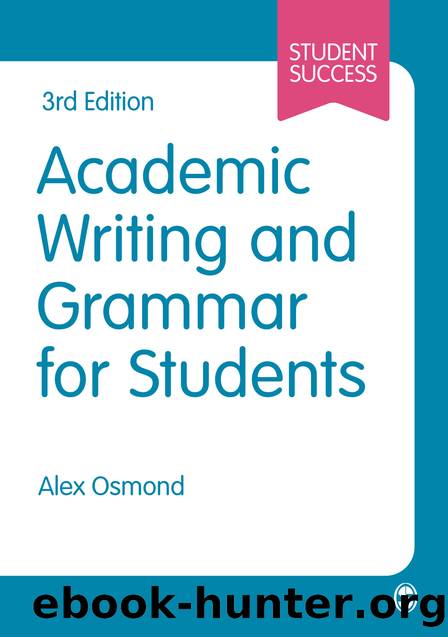Academic Writing and Grammar for Students by Alex Osmond;

Author:Alex Osmond;
Language: eng
Format: epub
Publisher: Sage Publications, Ltd. UK (Collection)
Published: 2024-03-27T08:37:04.627939+00:00
An important part of that definition is the word ârecklessâ, which means âwithout knowingâ. Not knowing that you must not plagiarise (so not knowing that you need to reference) or not knowing that you have plagiarised is no excuse.
So, you have to understand what plagiarism is, and be vigilant when writing your assignments.
Remember that this is a very important issue for your lecturers and tutors, too â being accused of plagiarism is a serious matter. If a published journal article or book is found to contain plagiarised material, it can damage reputations. For a real-life example, look up the story of Johann Hari, a journalist writing for The Independent who was embroiled in scandal when it was found he wasnât being honest about where quotes from his interviews came from.
I donât think itâs useful to focus on plagiarism as a big negative issue that you must avoid to ensure youâre not punished â you should focus on referencing as a positive, necessary part of writing assignments. Work hard at getting that right, and you probably wonât fall foul of the plagiarism rules at your university.
âPlagiarism detection softwareâ has become more commonly used over the last few years, so I thought I would mention it here. Different institutions have different policies â some allow their students full access to such tools, while others only provide such access to staff. It is important to be aware of the fact that this kind of software is only useful if you understand what plagiarism is already â as well as being aware of the things you need to do to reference properly. Thatâs why these tools can help tutors mark essays effectively â plagiarism detection software is supporting your lecturers in checking your writing carefully.
Students, however, should know that this kind of electronic tool is only effective if you have taken the time to think through the concept of plagiarism. Youâll also need to be in the process of developing your referencing skills. In this book, I often recommend using electronic tools to check and improve your work. Plagiarism detection tools are no exception, but they are no substitute for the required skills; I have encountered too many students looking to access the systems, seeing them as a kind of guaranteed failsafe against plagiarism.
You might, for example, get used to running your work through this powerful software, which essentially compares your writing with massive databases of other essays and published work. You need to understand that it should find matches with other work â whenever youâre citing another text directly, for example â and the fact that correct referencing is what ensures that this is not plagiarism.
My general advice, then, is to investigate the situation where you are studying. If tools are available to you, and youâre willing to learn about the key concepts underpinning their use, then of course it is fine to add such tools to your repertoire. Make sure, however, that you discuss your aims with your tutors, and donât put all your faith in computer software.
Download
This site does not store any files on its server. We only index and link to content provided by other sites. Please contact the content providers to delete copyright contents if any and email us, we'll remove relevant links or contents immediately.
Asking the Right Questions: A Guide to Critical Thinking by M. Neil Browne & Stuart M. Keeley(5355)
Autoboyography by Christina Lauren(5085)
Dialogue by Robert McKee(4157)
Eat That Frog! by Brian Tracy(4147)
Sticky Fingers by Joe Hagan(3908)
Journeys Out of the Body by Robert Monroe(3458)
Annapurna by Maurice Herzog(3291)
Full Circle by Michael Palin(3265)
Elements of Style 2017 by Richard De A'Morelli(3235)
Schaum's Quick Guide to Writing Great Short Stories by Margaret Lucke(3182)
The Art of Dramatic Writing: Its Basis in the Creative Interpretation of Human Motives by Egri Lajos(2857)
The Diviners by Libba Bray(2798)
Why I Write by George Orwell(2771)
The Mental Game of Writing: How to Overcome Obstacles, Stay Creative and Productive, and Free Your Mind for Success by James Scott Bell(2765)
In Patagonia by Bruce Chatwin(2752)
Atlas Obscura by Joshua Foer(2703)
The Fight by Norman Mailer(2698)
Venice by Jan Morris(2425)
The Elements of Style by William Strunk and E. B. White(2376)
